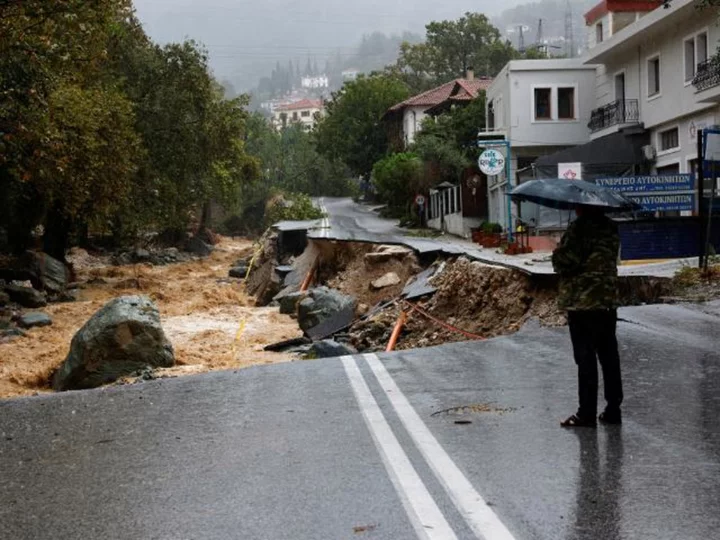At least 13 people have died and several remain missing across Greece, Turkey and Bulgaria as torrential rain and severe flooding batter southern Europe.
Flooding has claimed at least three lives in mainland Greece, seven in Turkey and left at least three people dead on Bulgaria's Black Sea coastline.
Greece, which has seen particularly intense rainfall, is braced for more flooding as the storm continues on Thursday.
A level 2 of 3 warning for severe storms was issued Wednesday for parts of Greece, with threats including torrential rainfall and potentially tornadoes.
The storm, which has officially been named Daniel by the national meteorological services in southeast Europe, has lashed the country with several months' worth of rain, flooding homes, businesses and roads.
It has claimed at least three lives in Greece. The latest victim was a man in his 80s who was swept away by the flooding near the town of Karditsa, in central Greece.
Speaking to reporters on Wednesday, Greek Civil Protection Minister Vassilis Kikilias called the storm an "unprecedented phenomenon."
He said that four people remain missing in central Greece, the part of the country that has been hit the hardest by the storm.
Kikilias noted that the port city of Volos, located around 330 kilometers (190 miles) north of Athens, is still dealing with heavy rains and the aftermath of the flooding, which damaged buildings and cars and caused the collapse of roads and bridges. The port of Volos was non-operational on Wednesday as much of the city remained without electricity.
Residents of a nursing home in the city had to relocate after a part of the building collapsed due to the rains, Greek public broadcaster ERT said on Wednesday.
During a televised briefing Wednesday, meteorologist Dimitris Ziakopoulos, who works for the Greek government's civil protection department, said the rainfall "is a huge number for Greek records and for most regions in Europe." Greek meteorologists have said the rainfall exceeds the amount normally seen in an entire year.
According to observations by Greece's meteorological service, 600 to 800 millimeters of rain fell in the area around Mount Pelion, near Volos, within 24 hours.
Roads have collapsed in the area and dozens of residents trapped in the floods in Pelion were evacuated by the Greek fire service.
Traffic has been banned in the towns of Trikala, Farsala and Karditsa in central Greece, according to police.
Greek Prime Minister Kyriakos Mitsotakis said the country was facing a "totally extreme weather phenomenon," as he urged the public to follow instructions from authorities.
In Turkey, at least five people have been killed in flash floods caused by torrential rain in Kırklareli, in the north-western part of the country, according to state news agency Anadolu. Two of the bodies were found on Tuesday and three on Wednesday.
Another two people died in the Istanbul districts of Başakşehir and Küçükçekmece on Tuesday, according to the Turkish Ministry of Interior Disaster and Emergency Management Presidency (AFAD).
Severe flooding has also struck Bulgaria's Black Sea coastline. Three deaths were confirmed in the municipality of Tsarevo in southern Bulgaria, national broadcaster BNT reported Wednesday. Another person is still missing in Tsarevo.
Flooding in the area has destroyed infrastructure and damaged roads and bridges.
The severe rain is the result of a very strong low-pressure system. The center of the storm has slowed to a crawl west of Greece in the Mediterranean and is expected to bring heavy rounds of rainfall across the region for the next day or so.
The storm appears to be forming into a tropical-like cyclone known as a "medicane". These systems can bring dangerous conditions to the Mediterranean Sea and coastal countries, similar to tropical storms and hurricanes in the Atlantic or typhoons in the Pacific.
The flooding tops off a summer in Europe characterized by extreme weather, from heat waves to devastating wildfires. Scientists are clear that as the human-caused climate crisis accelerates, this kind of extreme weather will become more common and more severe.

